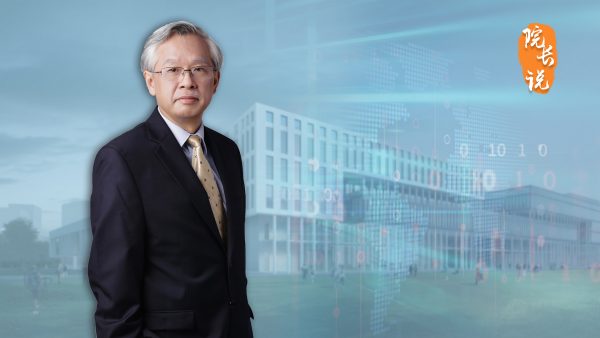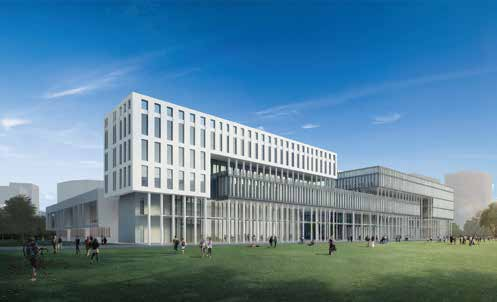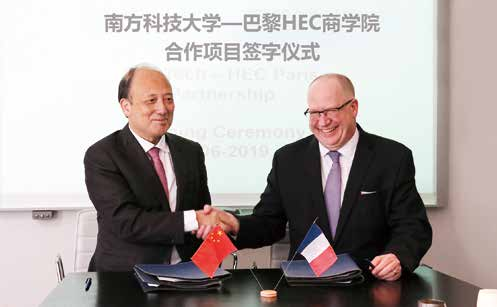During the 2019 SUSTech convocation, Wang Yunqi, a speaker representing doctoral students, quoted Google CEO Eric Schmidt, who told now-Facebook COO Sheryl Sandberg when she applied for jobs with him, “If you’re offered a seat on a rocket ship, don’t ask what seat. Just get on.”
Wang Yunqi had earned his bachelor’s and master’s degrees from the University of California Los Angeles (UCLA) and Columbia University before coming to SUSTech to join the Department of Finance in the College of Business as a doctoral student.
Economics and business have been popular majors for college students in recent years while providing vital support for Shenzhen’s innovation and entrepreneurship.
As SUSTech focuses on science & engineering while providing additional disciplines in business, humanities, and social sciences, how is SUSTech’s College of Business different from the other ones? What are the plans in line with the times? Therefore, this exclusive interview on Professor Huang Wei, Dean of the College of Business, will answer the questions.

SUSTech’s Innovative College of Business
Since the establishment of SUSTech, it has long been a leader in the development of its innovative academic disciplines. Its adherence to world-class university standards has seen SUSTech focus on the forefront of discipline development and departmental construction.
As one of the newest Schools at SUSTech, the College of Business strikes out in a “new business discipline” direction differentiating from typical business schools. Its focus on science and technology disciplines, fitting well within the vitality of Shenzhen’s innovative and entrepreneurial spirit.
World-class science and technology innovation centers have always had top business disciplines working hand-in-hand with renowned STEM institutions. Science and engineering complement economics and management. “A first-class STEM university normally has a first-class business school, such as MIT having Sloan Business School. The business school adheres to the strategic development thinking,” Huang Wei said.
Traditional business schools have spread themselves across many disciplines that tend towards independent research areas and, thus, a lack of interconnectedness. Further, these conventional approaches have seen subjects covered across different schools, resulting in ineffective use of resources and isolation of “knowledge island.”
“A first-class university of science and technology must have a first-class school of economics and management or a business school to support its sustainable development. The School adheres to innovation and opening-minded strategies, under the context of the Greater Bay Area Initiative, with a focus on international frontiers, interdisciplinary research. We aim to become a top-ranking business school at home and abroad with distinctive features,” said Professor Huang.
The School currently oversees two cross-disciplinary divisions: and the Divisions of Information Systems and Management Engineering (DISME) and the Divisions of Finance and Economics. It will continue to grow in the future under the leadership of Dean Huang Wei. The School will incorporate a wide range of disciplines in business and economics with the distinctive features of breaking down the wall of each traditional discipline and integrating formally isolated business disciplines.
In just over one year, the College of Business at Southern University of Science and Technology (SUSTech) has had two master’s degrees approved and established the Department of Information Systems and Management Engineering (DISME).
The SUSTech College of Business will buck this trend by utilizing the latecomer advantage. It will take a small and sophisticated approach to its pedagogy. Rather than following the traditional approach of setting up nine independently departments in business schools, the College of Business will build interdisciplinary divisions: the Division of Information Systems and Management Engineering, the Division of Business and Innovation Strategy, the Division of Public Policy and Governance, and the Division of Applied Economics and Finance. These divisions all reflect the core philosophy of being an interdisciplinary cutting-edge of innovation.
The founding philosophy, positioning, division setting, faculty development, research areas all reflect the strategy of the School working at the cutting edge of cross-discipline research and innovation. In Professor Huang Wei’s view, the College of Business must seize the opportunities, give play to its competitive advantages, and integrate its resources to achieve leap development.

Achievements and Development of the College of Business
The prior-existing Department of Finance has laid a solid foundation for the College of Business. In Huang Wei’s opinion, the College of Business is well placed on developing in line with the goals of the pioneering demonstration zone of Shenzhen. In just over one year, the College of Business at SUSTech also has had one doctoral degree program approved. The Research Center for Intelligent Management & Innovation affiliated to the College of Business has been approved as a Shenzhen Key Research Base for Humanities and Social Sciences in October 2019.
DISME will strive to develop cutting-edge and innovative new disciplines, such as big data management and business intelligence. Undergraduates will undertake courses in a wide range of areas, including information systems, operations management, digital economics, corporate culture, and organizational psychology. Students would be encouraged to incorporate subjects from other disciplines such as mathematics, computer science, biology, medicine, and liberal arts to maximize their interdisciplinary knowledge.
Faculty members in DISME are highly qualified and well-credentialed, with an annual UTD publication ratio per capita of 0.33 in the past five years before they joined the College of Business, increased to 0.363 within a year after joining SUSTech. This ratio is higher than that of the top business school around the Asia-Pacific region, which is 0.237.
The College of Business will provide world-class research and talent development pathways enabling future business leaders to be able to lead high-quality economic and industrial transformation. In the near future, the College of Business will become members of the Association to Advance Collegiate Schools of Business (AACSB). AACSB accreditation represents the top 5-6% of business schools in the world, and Dean Wei Huang has been an internationally accredited AACSB expert and will support the College of Business to be awarded the AACSB accreditation in the next 4-5 years.
Financial regulators across Shenzhen, Hong Kong, and Macau have looked to the College of Business to support the development of professional forward-looking Fin-Tech talent training programs for the Greater Bay Area. The College of Business has played a leadership role in designing and writing the training materials as well as conducting, organizing, and managing the training programs starting from November 2019.
Professor Huang Wei is a firm believer in the integration of business education with sciences, engineering, medicine, and liberal arts for higher education in China. The promotion of interdisciplinary business subjects with STEM majors will help build an international high-level discipline system suited for the new era. The College of Business has developed a Business Intelligence Analysis and Application Research Center with Foxconn Group, which ranked 25 in the Fortune 500 list. Last year, the College of Business launched its Quantitative History Research Center in conjunction with Professor Chen Zhiwu from the Faculty of Business and Economics, the University of Hong Kong, who was a tenured professor of Yale Business School.

Building an Innovative Business College for a New Business Discipline
At the start, the College of Business at SUSTech has established academic links with top business schools around the world. In June 2019, SUSTech President Chen Shiyi signed an agreement with HEC Paris for the collaborative of dual-degree programs and entrepreneurial innovation training programs. In October, Nathalie Lugagne, the Associate Dean of Executive Education of HEC Paris, led a delegation to SUSTech to advance the plan.
The College of Business has also promoted partnerships with the University of Cambridge, the University of Oxford, the Swiss Federal Institute Technology Zürich (ETH Zürich), and the National University of Singapore. Students have taken part in overseas exchanges or completed dual-degree programs at top universities around the world. It is this focus on providing students with an international perspective that has seen the College of Business develop its talent recruitment plan, bringing world first-class scholars from around China and across the globe to SUSTech.
The comprehensive talent development plan of the College of Business at SUSTech matches the recommendations of national policies by training application-oriented outstanding economic management talents. In taking this quest seriously, the College of Business has put together talent recruitment plans that have seen leading scholars from home and abroad conduct scientific research and cultivate the future management & economic leaders of the new era.
On August 19th, 2019, 181 CEOs from top businesses, including Apple, Google, and Amazon, signed the “Statement on the Purpose of the Corporation.” It states that “While each of our companies serves its corporate purpose, we share a fundamental commitment to all of our stakeholders.” This statement, compared with the “Statement on Corporate Governance” White Paper released in 1997, emphasizes companies’ contribution to the communal value of the society rather than limiting to economic returns to its owners. This event indicates a historic turning point for a modern corporation to run business globally with a different mindset and perspective.
“The greatest danger in times of turbulence is not the turbulence; it is to act with yesterday’s logic.” Dean Huang quoted Peter F. Drucker to reflect the perspective of the educational purpose of the College of Business. To echo the increasing demand for a sustainable society, it will carry out world-class research and quality executive training courses to enhance student’s modern practical skills in fields such as in the digital economy, business intelligence, and financial engineering (better known as Fin-Tech) while bringing social value. These future business leaders will be of great importance to across the Greater Bay Area and also Shenzhen as the pilot demonstration zone of the country.
Professor Huang Wei often encourages students to participate in real business problem-oriented research projects actively by applying their learned knowledge from textbooks to practice. He also urges students to get involved in Shenzhen City research projects that drive economic and social development. The college would challenge its students to find out the answers to the key questions such as “What do you want to be in your life? How do you become a contributor to your future employer and also for society as a whole?” He believes that students need to develop a positive outlook on life, to nurture positive values, and to learn the professional knowledge required to best serve society as a problem solver, not only a problem identifier.
The dual development drivers of the Greater Bay Area and the pilot demonstration zone of Shenzhen will bring more unprecedented opportunities. The College of Business will continue to develop solidly in such a historical prospect to become an internationally renowned business school embedded with AACSB accreditation within SUSTech, a world-class science and engineering research university rooted in China.

